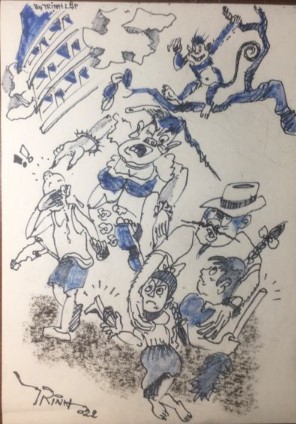
Illustration by Trịnh Lập
by Nguyễn Mỹ Hà
It's the fear of almost all parents whose children go to school each day.
School bullying today gets much public attention and is a reality your child might face when they go to school. The trigger can be serious, though sometimes it can be a very small conflict, but if handled in the wrong way it can become more severe.
A recent incident occurred at a school, where a child was attacked, but what happened next got much attention. The mother of the bullied child came rushing through the school, causing a stir with the school authorities, security and even the police handling the case.
She spoke with an uppity manner that sounded unacceptable even though she was just trying to get justice for her child.
Putting myself in her shoes, I could see myself getting into a rage and possibly losing my temper and control, and saying and doing things I would regret once it was all over.
What's the first thing you should do when you learn that your child is getting bullied?
Expert advice is to get the child away from the attacker and into a safe and peaceful environment. Get a first-hand assessment of the physical pain, if any, with the help of a medical doctor if needed, then get the child washed up, well-nourished, hydrated, comforted and to sleep.
Then it would help if you addressed your child's teacher and the school board. In most cases, the deputy principal will take care of such things.
In the Vietnamese public and private schools that I've got to know, the teachers are well aware of bullying and have their way of solving the problem effectively.
They alert both families, hold private talks with each side and then get the children to sit down together in the presence of their parents to apologise.
It is well noted that the bullying child may have been bullied before, so it's important not to label either child as a bully or a victim. Both sides need to be protected and talked to so that they realise what really went wrong and take action accordingly.
Then the next day, they needed to say what happened, and ensure all points of view are listened to carefully and attentively.
If the incident took place and became known in a school, then even if both sides have reconciled, sometimes one child changes school so as not to have to face each other to recall any unpleasant feelings.
It's a blessing that we can forget things. A child can inherit their parents' attitudes and behaviours. It's crucial to face facts, take action, and move on.
If a parent clings on to what happened for too long to their child, this could just reiterate everything that has happened and leave a deeper imprint on the memories of the child.
No one wants to go through such an ordeal, but if we understand that the incident has its way to be resolved and pain can be healed, we can become less consumed by rage or uncontrolled thinking.
How do you prepare a child to face violence when in school? How can you teach them to protect themselves and get the help they need.
It's hard to talk to small children aged 6 or 7 about bullying, but it is necessary. Educators say it's important to build a close-knit circle of friends when your child goes to school. The support from close friends makes them comfortable and, as a result, more open and friendly to other children, thus reducing the chances of creating a rivalry with another child.
Even if your child accidentally gets into a fight, a helping gesture from a close friend makes them feel secure and not alone.
I've been hanging onto this belief, correct me if I'm wrong, that for young men growing-up feeling and facing physical violence is just part of boys being boys whether it is through sport or even practising martial arts.
A kick here and there in class or outside of school can be a friendly gesture, not necessarily a provoking act. Arm wrestling, judo, taekwondo or vovinam are all combat sports that involve a certain degree of physical strength that can be good for a child's development.
But for young women, unless they play football or are particularly sports-minded, activities may involve one-on-one violence that should not be condoned.
There are kids whose physical abilities surpass their peers, and they sometimes hurt others without intention. On the other hand, some just want to exercise their physical prowess and make their friends obey in a very macho way, just like in the world of grown-ups.
These kids usually stand out, and it's not too hard to recognise them. Often befriending them or keeping a distance from them leads to a sense of safety. You can always address the matter with the teacher, who, with their experience and expertise, can tame a young and energetic child.
But the problem usually arises when the teacher is not around. It will always happen when your child is least prepared.
As a parent, I believe you need to get your child home in a safe and familiar place and assess the level of physical damage, first on your own or with the help of a medical doctor.
Then you'll need to hear everything your child has to say, let them say everything on their mind, and get rid of all the frustration accumulated from the conflict.
In any case, the first and most important thing is to help your child release the stress caused by the incident, then recover, become balanced again, get back in shape and move on from such an unpleasant experience. VNS
OVietnam